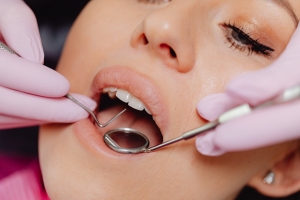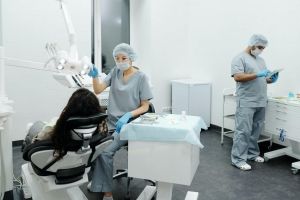There's something magical about a confident smile. It's not just about looks—it's about how you feel when you greet someone, speak in public, or simply look at yourself in the mirror. But for many people, dental problems can slowly steal that magic. Whether due to trauma, decay, wear, or congenital issues, losing function and beauty in your teeth affects more than just your appearance—it impacts your quality of life. Full Mouth Rehabilitation changes this situation, giving you your confidence back.
Now, if you're picturing a long, painful, and intimidating process, take a breath. Full mouth rehabilitation isn't a punishment—it's a second chance. It's a personalized journey designed to restore not only your teeth but your confidence, comfort, and health.
What Exactly Is Full Mouth Rehabilitation?
In simple terms, full mouth rehabilitation (or full mouth reconstruction) is a comprehensive dental treatment that addresses all of the teeth in your mouth. It combines restorative dentistry (like crowns, bridges, and implants) with cosmetic techniques (like veneers and teeth whitening) and sometimes orthodontic or surgical procedures, depending on the case.
The goal? To rebuild your smile from the ground up—functional, structural, and aesthetic.
This isn't a one-size-fits-all procedure. It's more like a tailored suit—fitted, precise, and entirely customized to your needs.
Who Might Need It?
Full mouth rehabilitation isn't just for the elderly or people with major dental trauma. You'd be surprised how many different walks of life end up benefiting from this kind of transformation.
Some people have worn down their teeth over the years through grinding or acid erosion. Others may have lost teeth due to decay, gum disease, or an accident. And then there are those born with conditions that affect the enamel or tooth structure. Whatever the cause, the result is often the same: difficulty chewing, chronic pain or discomfort, embarrassment when smiling, or even problems with speech.
When your dental issues start impacting your everyday life, it's a clear sign that something needs to change.
Not a Sprint, But a Marathon
Let's get real—full mouth rehabilitation isn't an overnight fix. It's a process, and yes, it takes time. You can think of it as giving your house a complete makeover. You will investigate all the details, right? Wiring too, to get the best foundation!
The same principle applies here. Your mouth is an intricate system of muscles, bones, nerves, and tissues—and each element has to work in harmony.
The first step is always a thorough evaluation. Your dentist will assess your teeth, gums, bite, jaw muscles, and overall oral health. You might get X-rays, scans, impressions, and photographs taken. This is your blueprint—the guide to planning what comes next.
From there, the treatment plan is built. It might include:
Crowns to restore strength and shape to damaged teeth.
Bridges or dental implants to replace missing teeth.
Orthodontics to correct bite alignment.
Periodontal treatments to restore gum health.
Veneers for a better smile!
Root canals for deep infections.
Bite analysis and equilibration to make sure everything functions smoothly.
Each phase is carefully timed. Some procedures require healing periods, and others might be staged to gradually correct alignment or bite problems. But throughout it all, the goal is progress—not perfection in one day.
More Than Just Teeth
Here's the part many people don't realize full mouth rehabilitation isn't just about teeth. It's about how those teeth function in your body and affect your overall well-being.
Chronic headaches? Jaw pain? Neck tension? These can sometimes be traced back to dental issues like misaligned bites or TMJ problems. You see with Full Mouth Rehabilitation you can really improve your overall health.
And let's not forget the emotional transformation. When you've been hiding your smile or living with pain, you carry that weight every day. Rebuilding your mouth can feel like getting a part of your life back—sometimes, a part you didn't realize was missing.
What to Expect After
Once the process is complete, most people report feeling like a whole new person. And yes, it takes some adjustment—your bite may feel different, or you might need time to get used to the new look. But that adjustment is temporary. The results, however, are long-lasting.
Maintenance is key, though. A new smile still needs good care—regular brushing, flossing, dental checkups, and sometimes special tools to clean around implants or bridges.
Is It Worth It?
Let's be honest—full mouth rehabilitation isn't a small investment. It takes time, money, and commitment. But ask anyone who's gone through it, and they'll likely tell you the same thing: it was absolutely worth it.
Because it's not just about looks. It's about quality of life. It's about finally being able to chew your favourite foods again, laugh without covering your mouth, and live without chronic dental discomfort. That kind of change is priceless.
Final Thoughts
If your mouth feels like it's falling apart—or if you've been told you need “a lot of work”—don't be discouraged. Full mouth rehabilitation isn't a punishment for bad teeth—it's a powerful solution for people who deserve better.
So, if you've been thinking about taking that step, maybe it's time. Your future smile and your future self will thank you.






